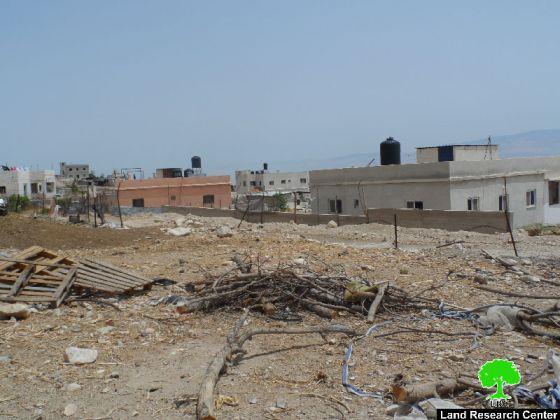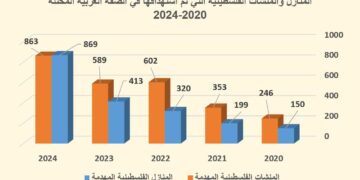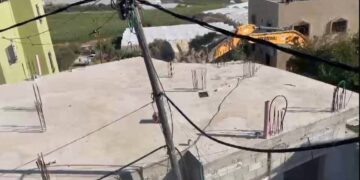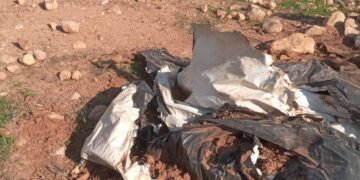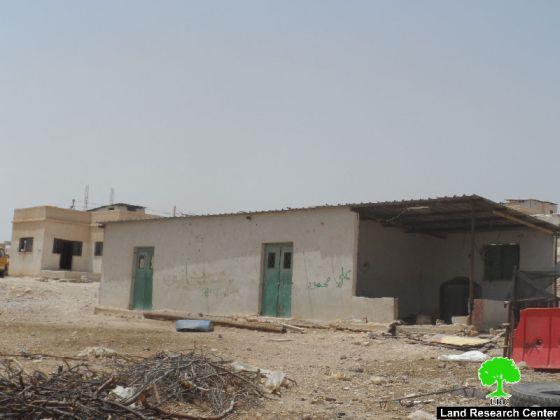Violation: stop-work orders for agricultural and residential structures in Al Auja.
Date: May 14, 2013.
Location: Al ‘Auja – Jericho.
Victims: 14 Bedouin families, 93 people including 42 children.
Details:
A new wave of Israeli military orders hit al ‘Auja village on May 14, 2013. Israeli troops handed 14 families stop-work orders for residential and agricultural structures. The orders were issued under the pretext of unlicensed construction in area classified ‘C’ according to Oslo Accords. The orders also set July 2, 2013 as a date of a hearing session to be held in Beit El Military Court in regard to the structures.
Al ‘Auja Mayor commented: "the Israelis are intensifying their attacks against the Palestinians in al Auja; since the beginning of the year, 21 military orders have been served to people while three actual demolitions were carried out".
Table 1: victims:
|
Victim
|
Family members
|
Children
|
Area (m2)
|
Structures
|
Order no.
|
|
Atallah Jahaleen
|
8
|
3
|
60
|
residence
|
|
|
Rafi’ Jahaleen
|
11
|
4
|
60
|
Residence
|
|
|
Ahmad Jahaleen
|
7
|
4
|
100
|
Residence
|
|
|
Yousuf Salama Jahaleen
|
6
|
2
|
45
|
Barn
|
|
|
Salem Jahaleen
|
9
|
2
|
60
|
Residence
|
|
|
Yousuf Musallam Jahaleen
|
4
|
1
|
45
|
Barn
|
|
|
Ali Jahaleen
|
7
|
5
|
45
|
Barn
|
|
|
Omar Najada
|
2
|
0
|
60
|
Barn
|
|
|
Umran Najada
|
6
|
3
|
45
|
Barn
|
|
|
Mousa Najada
|
11
|
4
|
60
|
Barn
|
|
|
Odeh Najada
|
4
|
2
|
90
|
Barn
|
|
|
Ahmad Najada
|
5
|
3
|
45
|
Barn
|
|
|
Suleiman Najada
|
7
|
5
|
100
|
residence
|
|
|
Salem Najada
|
6
|
4
|
120
|
residence
|
|
|
Total
|
93
|
42
|
935
|
|
|
*source: Field Observations – Monitoring Israeli Human Rights Violations Team – LRC
Picture 1-3: threatened residences
Al ‘Auja – an Overview:
It is located 12 km to the north east of Jericho city, adjacent to the Jordan River. It is edged by the eastern regional road that leads far north to Bisan. Its total area is 106900 dunums, inhabited by 4131 people.
The village’s boundaries reach up to Fasayel in the north and An Nuwei’ma (south), Jordan River (east) and Ramallah Mountains (west). Residents depend largely on agriculture in their living because of the availability of water. The Israeli Occupation captured huge areas of Al ‘Auja for colonial expansion purposes besides having several military bases there.
The Israelis, in addition, have isolated more than 20 dunums in an area known as As Sahel and was announced as a "military zone". The Israelis have established several colonies around the village, Nitaf (1967), Niran (1977), Noomi (1979), Tomer, and Netiv Hagedud in addition to placing numerous watchtowers around the village.
Most importantly, the lack of water has been hindering any development efforts in the village. The Israelis had, first, dried out Al ‘Auja River which used to provide 1800 m3 / hour leaving the villagers dependant only on tiny springs with salty water. This had catastrophic effects on the residents and on the agricultural sector in the area.

